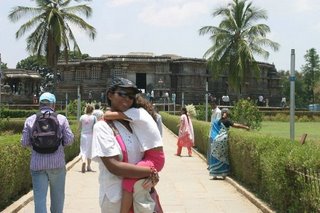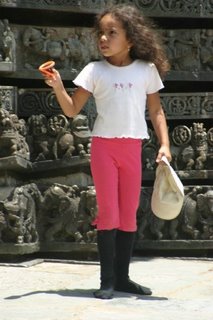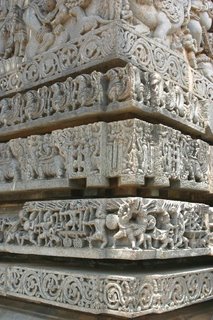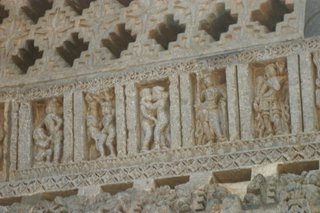Our trip to Halebit
Halebid, (Halebidu in Kannada), located in Hassan district, Karnataka, India, is home of one of the greatest examples of Hoysala architecture.
The Temple complex comprises of two temples. In front of these temples there is a big lake. So it is said that it was called Dhwara samudhra which means entrance from ocean. The two nandi bulls which are in front of the temples are monolithic. It is said that soap stones are used for the construction of these temples.
But a number of sculptures in the temple are destructed by the invaders. So the temple is incomplete. It is said that the name Halebid means Destroyed City. Now there is an archeological museum in the Temple complex.
The Hoysaleswara Temple, dating back to the 12th century, is astounding for its wealth of sculptural details. The walls of the temple are covered with an endless variety of gods and goddesses, animals, birds and dancing girls. Yet no two facets of the temple are the same. This magnificent temple - guarded by a Nandi Bull - was never completed, despite 86 years of labour. The Jain basadis nearby are equally rich in sculptural detail. Belur and Halebid are 222 and 216 km from Bangalore, respectively. This temple is now being proposed as UNESCO World Heritage Site.
The walls of the temple are covered with an endless variety of gods and goddesses, animals, birds and dancing girls. Yet no two facets of the temple are the same. This magnificent temple - guarded by a Nandi Bull - was never completed, despite 86 years of labour. The Jain basadis nearby are equally rich in sculptural detail. Belur and Halebid are 222 and 216 km from Bangalore, respectively. This temple is now being proposed as UNESCO World Heritage Site.

It was very hot in Halebid, around 39 degree, so the stones were very hot as well. I gave Cara my socks, so she could walk around the temple. We had a tour guide, which explained us the carvings on the outside. For this she used a small miror to point to the figures - a simple device but as effective as a laser pointer. Cara liked this ofcourse a lot , so she was using it as well. The carvings on the outside are really very impressive, seven layers of figures on top of each other and not two figures are the same. The temple was not only used for religous pruposes but served as well as an education site for the common people, so some figures also explain the positions of Kamasutra, as you can see on the picture
Cara liked this ofcourse a lot , so she was using it as well. The carvings on the outside are really very impressive, seven layers of figures on top of each other and not two figures are the same. The temple was not only used for religous pruposes but served as well as an education site for the common people, so some figures also explain the positions of Kamasutra, as you can see on the picture
The Temple complex comprises of two temples. In front of these temples there is a big lake. So it is said that it was called Dhwara samudhra which means entrance from ocean. The two nandi bulls which are in front of the temples are monolithic. It is said that soap stones are used for the construction of these temples.

But a number of sculptures in the temple are destructed by the invaders. So the temple is incomplete. It is said that the name Halebid means Destroyed City. Now there is an archeological museum in the Temple complex.
The Hoysaleswara Temple, dating back to the 12th century, is astounding for its wealth of sculptural details.
 The walls of the temple are covered with an endless variety of gods and goddesses, animals, birds and dancing girls. Yet no two facets of the temple are the same. This magnificent temple - guarded by a Nandi Bull - was never completed, despite 86 years of labour. The Jain basadis nearby are equally rich in sculptural detail. Belur and Halebid are 222 and 216 km from Bangalore, respectively. This temple is now being proposed as UNESCO World Heritage Site.
The walls of the temple are covered with an endless variety of gods and goddesses, animals, birds and dancing girls. Yet no two facets of the temple are the same. This magnificent temple - guarded by a Nandi Bull - was never completed, despite 86 years of labour. The Jain basadis nearby are equally rich in sculptural detail. Belur and Halebid are 222 and 216 km from Bangalore, respectively. This temple is now being proposed as UNESCO World Heritage Site.
It was very hot in Halebid, around 39 degree, so the stones were very hot as well. I gave Cara my socks, so she could walk around the temple. We had a tour guide, which explained us the carvings on the outside. For this she used a small miror to point to the figures - a simple device but as effective as a laser pointer.
 Cara liked this ofcourse a lot , so she was using it as well. The carvings on the outside are really very impressive, seven layers of figures on top of each other and not two figures are the same. The temple was not only used for religous pruposes but served as well as an education site for the common people, so some figures also explain the positions of Kamasutra, as you can see on the picture
Cara liked this ofcourse a lot , so she was using it as well. The carvings on the outside are really very impressive, seven layers of figures on top of each other and not two figures are the same. The temple was not only used for religous pruposes but served as well as an education site for the common people, so some figures also explain the positions of Kamasutra, as you can see on the picture


0 Comments:
Kommentar veröffentlichen
<< Home